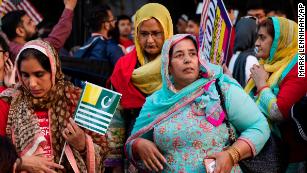Indian royals win $43 million in dispute over bank deposit from 1948
The High Court in London has decided that a deposit left untouched in a British bank account since 1948 is the rightful property of the descendants of the monarch who transferred it -- and not Pakistan.
The Nizam of Hyderabad ruled over his independent state from 1911 until 1948, when the Indian Army invaded it.
The partition that accompanied the end of British rule had established India and Pakistan as two independent states the previous year, and the Nizam had resisted joining either.
Just days after his state's annexation, he transferred £1 million ($1.23 million) to an account with an English bank, which is now part of NatWest bank, held under the name of the then High Commissioner of newly-formed Pakistan. With added interest, it is now worth £35 million ($43.1 million).
Imran Khan and Narendra Modi adress the UN, as thousands protest outside
A legal dispute over its ownership started when the Nizam tried unsuccessfully to recover the money shortly afterwards, and only ended with Wednesday's judgement some seven decades later.
The Nizam's heirs, as well as India and Pakistan, had all claimed the fortune as theirs.
The case was heard by the House of Lords, the then supreme court in Britain, in 1957. However, the dispute stalled when the judges accepted Pakistan's assertion of sovereign state immunity, as reported by the UK's PA news agency.
Pakistan waived this right in 2013 by launching a claim against NatWest, which said it would give the deposit to whoever the court ordered.
On Wednesday, the judge, Mr. Justice Marcus Smith decided it should go to the grandsons of the Nizam. In a ruling reported by PA, he concluded the Nizam's "motivation" was to "keep the fund away from India -- to safeguard it."
A letter to Pakistan's then High Commission from Hyderabad's finance minister was used as evidence. It asked for the amount to be "kindly kept... in trust" so that the interests of the state could be safeguarded.
Philip Barden, a partner at Devonshires law firm, who represented one of the Nizam's heirs, said: "This was an unusual and fascinating case that required the court to delve into the history books and reconstruct events that took place over 70 years ago...," according to PA.
Describing Pakistan's claim of sovereign immunity in the 1950s as nothing more than a "Pyrrhic victory," he added: "In this case, justice delayed has not ultimately been denied."
India's Ministry of External Affairs said in a statement that the court had found in favor of India and the Nizam's two grandsons.
A woman confronted Priyanka Chopra, calling her a hypocrite. The actress said she's patriotic
It said: "Having found that the 7th Nizam was beneficially entitled to the Fund, the Court concluded that those claiming in right of the 7th Nizam i.e. India and the two grandsons of Nizam were now entitled to have the Fund."
An undisclosed agreement was reached between the grandsons and India last year on how to split the money if they won the case.
The Pakistani government said it was considering its legal options following the ruling.
The country's Ministry of Foreign Affairs said in a statement that the court had failed to "take into account the historical context of the transfer when India illegally annexed Hyderabad in violation of International Law and all civilized norms, leading the Nizam of Hyderabad to make desperate efforts to defend his people and the state from Indian invasion."
It added: "The Nizam as a sovereign approached Pakistan for assistance which the Government of Pakistan provided."
News Courtesy: www.cnn.com













